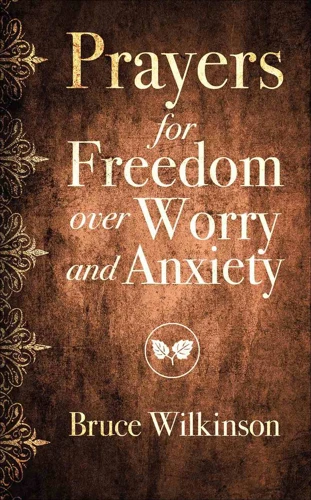The Transformative Power of Prayer

Prayer has been a powerful tool for millions of people for thousands of years, providing a sense of comfort, guidance, and solace during trying times. The transformative power of prayer is undeniable, offering an inner peace that surpasses all understanding. It allows us to surrender our worries and fears to a higher power, relieving our minds of the stress and anxiety that often accompany them.
Through prayer, we can tap into a higher source of wisdom and strength that empowers us to face life’s challenges with renewed determination and resilience. It is a way to connect with the Divine and access the many gifts and blessings that come with a life of faith.
Prayer is not just a spiritual practice, but also a physiological one. Studies have shown that prayer can have positive effects on our mental and physical health, including decreased levels of stress and anxiety, improved immune function, and reduced blood pressure.
Whether we pray alone or with others, in silence or through recitation, prayer has the power to transform our lives in countless ways. It can help us find meaning and purpose in life, deepen our relationships with others, and provide a sense of hope and security during uncertain times.
Through the transformative power of prayer, we can cultivate a deep sense of inner peace and well-being that transcends our circumstances and allows us to live from a place of love and compassion. By turning to prayer, we open ourselves up to a world of possibilities, and unlock the full potential of our human spirit.
Understanding Anxiety and Worry

Anxiety and worry have become increasingly prevalent in today’s society, affecting individuals of all ages and backgrounds. While these two states of mind are often used interchangeably, they actually have distinct differences in their causes and symptoms. Anxiety can be described as a persistent sense of fear or dread that interferes with daily life, often accompanied by physical symptoms such as rapid heartbeat, sweating, and nausea. On the other hand, worry involves the cyclical pattern of negative thoughts and concerns about potential future events or uncertainties. Understanding the nuances of anxiety and worry is key to effectively addressing and overcoming them through prayer.
What is Anxiety?
Anxiety is a complex and often debilitating mental health condition. It’s characterized by persistent and excessive worry or fear about everyday situations, even when there is little to no actual danger present. Those who suffer from anxiety often experience a range of physical symptoms, such as a rapid heartbeat, sweating, trembling, and shortness of breath, in response to these perceived threats.
Some common types of anxiety disorders include:
- Generalized Anxiety Disorder (GAD): a condition in which a person experiences excessive anxiety or worry about a wide range of issues, including work, health, and personal relationships, to name a few.
- Panic Disorder: a type of anxiety disorder characterized by sudden and intense periods of fear, often accompanied by physical symptoms such as chest pain, dizziness, and sweating.
- Social Anxiety Disorder: a condition that results in intense fear or anxiety in social situations, such as meeting new people, giving presentations, or attending parties.
- Phobias: an irrational and intense fear of a particular object, situation, or activity, such as heights, enclosed spaces, or flying.
It’s important to note that while anxiety is a common human experience, experiencing anxiety on a regular basis can lead to significant distress and limit one’s quality of life. If you are experiencing persistent anxiety or worry that is affecting your ability to function in day-to-day life, it may be helpful to speak with a mental health professional.
What is Worry?
Worry, often used interchangeably with anxiety, is a type of negative thinking characterized by excessive concern over future events, situations, or outcomes. The concerns that worry produces typically stem from uncertainty or a lack of control over the events or circumstances.
Signs and Symptoms of Worry
Worry is often accompanied by various physical, emotional, and behavioral signs and symptoms. These may include:
| Physical | Emotional | Behavioral |
| Headaches | Fear | Restlessness |
| Fatigue | Difficulty concentrating | Difficulty sleeping |
| Muscle tension | Irritability | Avoiding social situations |
| Upset stomach | Overthinking | Compulsive behaviors |
Causes of Worry
Worry can be caused by various factors, such as:
- Environmental factors: stressful situations, living in an unpredictable environment, exposure to traumatic events, etc.
- Genetic factors: research suggests that some individuals may be more prone to anxiety disorders due to genetic factors.
- Brain chemistry: an imbalance in neurotransmitters such as serotonin, dopamine, or norepinephrine can contribute to anxiety disorders.
- Life events: significant life changes, such as job loss, relationship problems, or financial difficulties, can trigger anxiety and worry.
Impact of Worry on Daily Life
The persistent worrying that characterizes anxiety can have a significant impact on an individual’s ability to function in daily life. It can affect concentration, performance, relationships, and overall quality of life. It can also increase the risk of developing other mental health conditions, such as depression or post-traumatic stress disorder (PTSD).
Treatment for Worry
Various treatment approaches can be effective in reducing and managing worry, including cognitive-behavioral therapy (CBT), mindfulness-based therapies, medication, self-help strategies, and prayer. Lifestyle changes, such as regular exercise, healthy eating, and stress management techniques, can also help reduce worry levels.
The Connection Between Prayer and Anxiety

As human beings, we often find ourselves overwhelmed with the pressures and challenges of life. Many of us struggle with anxiety and worry, which can have a debilitating impact on our physical and mental health. However, there is a powerful tool that can help us in our quest for peace and tranquility – prayer. Prayer has been shown to have a strong connection with anxiety, and can be an effective means of managing and overcoming it. In this section, we will explore the relationship between prayer and anxiety, and how it can transform our lives.
The Role of Faith
Faith is an integral part of prayer and can play a significant role in overcoming anxiety and worry. Believing in a higher power, whether it be God, the universe, or something else, can provide a sense of comfort and security during difficult times.
Here are some ways in which faith can be beneficial:
- Increased sense of hope: When one has faith and believes in a positive outcome, it can provide a ray of hope in even the darkest of situations. This hope can be a source of strength and motivation to keep pushing forward.
- Reduced feelings of isolation: When dealing with anxiety and worry, it can be easy to feel like you are alone in your struggles. However, having faith in a higher power can provide a sense of connection to something greater than oneself.
- Greater perspective: Faith can help individuals look beyond their current circumstances and see the bigger picture. This can help put their worries and anxieties into perspective and bring a sense of peace.
- Increased sense of control: Believing in a higher power can give individuals a sense of control over their lives, even in situations that seem out of their control. This can provide a sense of empowerment and reduce feelings of helplessness.
- Opportunities for community support: Many religious communities offer support groups and other resources for individuals struggling with mental health issues. Belonging to a community that shares your beliefs and values can be a source of comfort and support.
It is important to note that faith is a personal matter and may look different for each individual. Some might find solace in organized religion, while others may find comfort in meditation or spending time in nature. The key is to find what works best for you and to use it as a tool to overcome anxiety and worry.
How Prayer Impacts the Brain
Research has shown that prayer can have a positive impact on the brain, particularly when it comes to managing anxiety and worry. When we pray, various areas of the brain are activated, including the prefrontal cortex, which is responsible for decision-making and impulse control.
Additionally, prayer can stimulate the release of endorphins, also known as the “feel-good” chemicals in the brain, which can promote a sense of relaxation and well-being. These endorphins can also act as natural painkillers, helping to reduce physical symptoms associated with anxiety.
Consistent prayer can actually change the brain’s neural pathways, resulting in a strengthening of positive thought patterns and a reduction in negative thought patterns. This can be especially helpful for those struggling with anxiety or worry, as negative thoughts can often spiral out of control and lead to heightened levels of stress.
In fact, prayer has been shown to increase activity in the anterior cingulate cortex, which is the area of the brain responsible for regulating emotional responses and processing conflict. This can lead to a greater ability to manage stress and emotional turmoil.
Prayer can be a powerful tool for managing anxiety and worry by positively impacting the brain through the activation of various areas and the release of endorphins. Through consistent prayer, individuals can also strengthen positive thought patterns and improve their ability to regulate emotions.
How to Pray for Anxiety and Worry

As we’ve discussed, prayer has the potential to be a powerful tool in combating anxiety and worry. However, the act of prayer itself can sometimes feel overwhelming or unfamiliar, especially if you are new to faith or have never practiced prayer regularly before. It’s normal to feel uncertainty about how to pray, but the good news is that there are many ways to approach prayer that can help ease anxiety and bring a sense of calm. Below, we’ll outline some techniques and tips for praying to overcome anxiety and worry.
Developing a Daily Practice
One of the keys to harnessing the power of prayer in overcoming anxiety and worry is through developing a daily practice. Here are some tips to help you get started:
- Schedule prayer time: Just like any other important task, make sure to set aside time specifically for prayer. It’s recommended to start and end your day with prayer.
- Find a quiet space: It’s important to have a space where you can focus and feel comfortable. Try to find a quiet space where you can be alone with your thoughts and prayers.
- Start small: If you’re new to prayer, start with just a few minutes a day and gradually increase the time as you become more comfortable with the practice.
- Be consistent: Consistency is key when it comes to developing a daily practice. Try to pray at the same time every day, and stick to your schedule as much as possible.
- Use prayer resources: If you’re struggling with what to say during prayer, there are many resources available such as books or online articles that can provide guidance.
- Be open and honest: When praying, it’s important to be open and honest with God. Share your struggles, worries, and fears. This will help you feel more connected to your faith and provide a sense of relief.
By developing a daily practice in prayer, you can gradually build your relationship with God, and find comfort and peace in times of anxiety and worry.
Prayer Techniques to Try
There are many different prayer techniques that can be effective in overcoming anxiety and worry. Here are some techniques you can try to incorporate into your daily practice:
| Technique | Description |
|---|---|
| Mindful Breathing Prayer | This technique involves focusing on your breath and repeating a prayer, such as “Lord, have mercy on me” or “Peace be with me.” Breathe in deeply and slowly, and exhale slowly while repeating the prayer. Allow each inhale to fill you with peace and each exhale to release any anxious or worried thoughts. |
| Gratitude Prayer | Focusing on things we’re thankful for is a powerful way to shift our mindset. Start by listing a few things you’re thankful for, then offer a prayer of gratitude to God for these blessings. This technique reminds us of the good in our lives and helps us to find positive thoughts that can replace negative ones. |
| Blessing Prayer | This technique involves focusing on others and lifting them up in prayer. Choose someone you know who is struggling or in need of support, and pray for them. You can ask God to bless and protect them, or offer a prayer of strength and encouragement. This technique encourages us to shift our focus away from our own worries and to serve and care for others. |
| Visualization Prayer | This technique involves imagining a peaceful scene or a positive outcome to a situation that is causing anxiety. Close your eyes and picture yourself in a tranquil setting, such as a beach or a garden. You can also use this technique to visualize yourself successfully overcoming a challenge or achieving a goal. Use a prayer to ask God to guide and support you in this endeavor. |
Remember, different techniques may work better for different individuals. Experiment with these techniques, and find what works best for you. The most important thing is to develop a daily prayer practice that helps you to connect with God and find peace in the midst of anxiety and worry.
The Power of Gratitude
One powerful technique to incorporate in prayer for anxiety and worry is the practice of gratitude. Expressing gratitude regularly can shift our focus from negative thoughts and worries to the positive aspects of our lives, instilling a sense of peace and well-being.
Here are some ways to incorporate gratitude in your prayer practice:
| 1. Gratitude Journal | Take a few minutes each day to write down things you’re grateful for in a journal. This can be anything from good health to supportive friends and family, or even small everyday things like a warm cup of coffee or a beautiful sunset. Reflecting on these blessings can help cultivate a sense of gratitude and decrease feelings of anxiety and worry. |
|---|---|
| 2. Gratitude Meditation | Start your prayer practice with a few moments of silence and focus on your breath. When you feel centered, direct your attention to things you’re grateful for. Picture the faces of loved ones or the beauty of nature. Allow yourself to feel the warmth and joy these things bring. This can help shift your mindset to a more positive one, easing feelings of anxiety and worry. |
| 3. Gratitude Walk | Take a walk in nature and focus on things you’re grateful for. Feel the warmth of the sun on your skin, listen to the sound of birds chirping, or marvel at the beauty of blooming flowers. Research shows that spending time in nature can have a calming effect on the mind and body, reducing symptoms of anxiety and worry. |
Incorporating gratitude in your daily prayer practice can help shift your focus away from negative thoughts and fears, and towards the positive aspects of your life. It can instill a sense of peace and well-being, and help reduce symptoms of anxiety and worry.
Tips for Overcoming Anxiety and Worry

If you struggle with anxiety and worry, you know how debilitating it can be. The good news is that there are many strategies you can use to manage and overcome these feelings. Implementing some simple lifestyle changes, managing negative thoughts and trusting in a higher power are all effective techniques for reducing anxiety and worry. Through the power of prayer, you can also find peace amidst the chaos of stress and anxiety. In this section, we’ll explore some tips and techniques for overcoming anxiety and worry that you can implement in your daily life.
Lifestyle Changes
Making lifestyle changes can greatly help in overcoming anxiety and worry. Here are some practical steps you can take:
| Regular Exercise: | Exercise releases endorphins, which are chemicals that improve your mood, reduce stress, and promote relaxation. Aim for at least 30 minutes of exercise, three to five times a week. |
| Healthy Eating: | A well-balanced diet can help regulate your body’s chemical processes and improve your overall health. Avoid consuming too much caffeine, sugar, and processed foods as they can lead to mood fluctuations and increased anxiety. |
| Quality Sleep: | Avoid stimulating activities before bedtime such as watching TV or using electronic devices. Instead, try relaxing activities such as reading or meditation to help you unwind. Aim for 7-8 hours of sleep every night. |
| Time Management: | Learn to prioritize your tasks and delegate responsibilities to avoid feeling overwhelmed. Make a to-do list to ensure you accomplish what really matters, and avoid procrastination as it can only worsen anxiety levels. |
Making these lifestyle changes can help reduce anxiety and promote a healthier mindset overall. Additionally, they can supplement the power of prayer and help you find peace and calmness amidst a busy and stressful world.
Managing Negative Thoughts
When dealing with anxiety and worry, negative thoughts can quickly take control and make things feel overwhelming. However, there are strategies that can help manage these negative thoughts and bring a sense of peace and clarity.
1. Recognize negative thoughts: The first step in managing negative thoughts is to become aware of them. Pay attention to your thoughts and notice when they become negative or anxious. This can help you identify patterns and triggers.
2. Challenge negative thoughts: Once you have identified negative thoughts, challenge them. Ask yourself if the thought is true or if there is evidence to support it. Often, negative thoughts are not based in reality, and challenging them can help break their hold.
3. Reframe negative thoughts: Reframing negative thoughts involves taking the negative thought and turning it around to create a more positive and realistic perspective. For example, instead of thinking “I can’t handle this situation,” reframe it as “This situation is challenging, but I am capable of finding a solution.”
4. Practice mindfulness: Mindfulness involves being present in the moment and observing your thoughts without judgment. This can help you recognize negative thoughts as they arise and let them go without getting caught up in them.
5. Seek support: Don’t be afraid to reach out for support from friends, family, or a mental health professional. They can provide perspective and guidance in managing negative thoughts and finding ways to cope with anxiety and worry.
By recognizing, challenging, reframing, practicing mindfulness, and seeking support, it is possible to manage negative thoughts and find a sense of peace and calm in the face of anxiety and worry.
Trusting in a Higher Power
When it comes to overcoming anxiety and worry, it can be helpful to trust in a higher power, whatever that may be for each individual. Trust and faith can provide a sense of comfort and peace during times of stress and uncertainty.
One way to cultivate trust in a higher power is through prayer and meditation. Taking time to connect with something greater than oneself can offer perspective and a renewed sense of purpose. Letting go of the need to control everything and placing trust in a higher power can alleviate some of the burden of anxiety and worry.
Another aspect of trusting in a higher power is finding meaning and purpose in difficult experiences. Believing that everything happens for a reason, even if that reason is unclear, can provide a sense of hope and resilience. It can also offer a sense of community, as many faiths and belief systems emphasize the importance of supporting one another through challenging times.
Ultimately, trusting in a higher power can provide a sense of peace and grounding, even in the midst of anxiety and worry. It can offer a reminder that there is something greater than oneself and that it is possible to find meaning and purpose in difficult situations.
The Benefits of Combining Faith with Therapy
Incorporating faith into therapy can have numerous benefits for individuals struggling with anxiety and worry. Many people find comfort and support in their religious beliefs and practices, which can be an essential source of strength and hope during difficult times. Combining elements of faith with traditional therapy approaches can create a holistic treatment program that addresses both the physical and spiritual aspects of anxiety and worry.
One of the main advantages of combining faith and therapy is the ability to draw on both secular and non-secular resources. Clients who seek therapy from therapists who share similar religious beliefs may feel more comfortable discussing their concerns and problems openly. This can facilitate deeper, more honest conversations that lead to greater insight and awareness. Additionally, incorporating prayer and other religious practices into therapy can provide a sense of grounding and stability, which can be especially valuable during times of high stress and anxiety.
Faith-based therapy can also provide a sense of community and connection for those who feel isolated or alone in their struggles. Many religious organizations offer support groups, counseling services, and other resources for individuals who are dealing with anxiety or other mental health challenges. Participating in these programs can help individuals recognize that they are not alone in their struggles and that there is hope for healing and restoration.
However, it’s important to note that combining faith and therapy is not a substitute for medical or psychological treatment. While faith-based practices can provide significant emotional and spiritual benefits, they may not be sufficient for treating all forms of anxiety and worry. It’s essential to consult with a qualified mental health professional to determine the best course of treatment for your specific needs.
Ultimately, combining faith and therapy can be a powerful way to promote healing, growth, and transformation. By tapping into the power of prayer and spiritual practices, individuals can gain a deeper understanding of themselves and their relationship with a higher power, which can provide a sense of peace and purpose during even the most challenging times.
Conclusion: Finding Peace Through Prayer
It’s evident that prayer has the power to bring peace to those who struggle with anxiety and worry. Through prayer, we can connect with a higher power and find comfort in the knowledge that we are not alone in our struggles. By focusing on faith and gratitude, we can shift our mindset and begin to view situations in a more positive light.
While prayer can be a powerful tool on its own, it’s important to note that it can work even more effectively when combined with therapy or other treatment options. Seeking professional help can provide additional tools and strategies for managing anxiety and developing coping mechanisms.
Above all, the key to finding peace through prayer is to develop a consistent practice that works for you. Whether it’s through traditional prayer, meditation, or gratitude journaling, finding time each day to connect with a higher power and focus on positive thoughts can make a significant difference in managing anxiety and finding inner peace.
So if you find yourself struggling with anxiety and worry, don’t hesitate to turn to prayer. Through faith and dedication, prayer can help you find the peace and comfort you need to navigate life’s challenges with greater ease and clarity.
Frequently Asked Questions
1. Can prayer really help with anxiety?
Yes, numerous studies have shown that prayer can have a positive impact on reducing symptoms of anxiety and promoting feelings of calmness and well-being.
2. Is it necessary to have religious faith to benefit from prayer?
No, even individuals who do not have a specific religious faith can experience the calming effects of prayer through the act of simply focusing their thoughts and intentions on something or someone outside of themselves.
3. Can prayer be used as a substitute for professional therapy or medication?
No, while prayer can be a helpful supplement to professional treatment, it is not a replacement for therapy or medication prescribed by a licensed healthcare provider.
4. What are some common misconceptions about prayer and anxiety?
One common misconception is that prayer is only effective for individuals who belong to a particular religion or denomination. Another is that prayer is a form of magical thinking or wishful hoping rather than a legitimate tool for promoting mental and emotional health.
5. How can prayer impact the physical and emotional aspects of anxiety?
Prayer can help to calm the nervous system, reduce stress hormones in the body, improve mood, and promote feelings of relaxation and well-being.
6. Can praying with others have a greater impact than praying alone?
Yes, studies have shown that sharing in a collective prayer experience can create a sense of social support and belonging, which can in turn promote greater emotional resilience and reduce symptoms of anxiety.
7. What are some practical tips for developing a daily prayer practice?
Some tips include finding a quiet and comfortable space to pray, setting aside a specific time each day for prayer, using guided meditation or prayer resources, and staying consistent even on days when you may not feel like praying.
8. How can gratitude play a role in prayer for anxiety?
Expressing gratitude during times of anxiety can help to shift focus away from negative thoughts and emotions and onto positive aspects of life. Incorporating gratitude into a daily prayer practice can promote feelings of joy and contentment.
9. What are some common lifestyle changes that can help to reduce symptoms of anxiety?
Some common lifestyle changes include getting regular physical exercise, eating a balanced and healthy diet, getting enough sleep, practicing mindfulness, and avoiding or limiting consumption of caffeine and alcohol.
10. How can therapy and faith be combined to address anxiety?
A therapist who has an understanding of the intersection between spirituality and mental health can help individuals to explore the ways in which their faith may be impacting their anxiety. By combining cognitive-behavioral therapy techniques with prayer and other spiritual practices, individuals may be able to experience greater relief from symptoms of anxiety.








